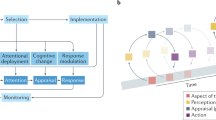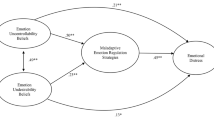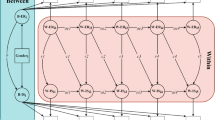Abstract
Although definitions of emotion dysregulation infer difficulties in selecting and implementing emotion regulation (ER) strategies, surprisingly few studies have examined the relationship between trait emotion dysregulation and a wide range of specific ER strategies. The present study used a data-driven approach to assess trait- and state-related ER strategy use in 99 women (aged 18–55) recruited from the community with varying levels of trait emotion dysregulation. Participants completed self-report questionnaires assessing habitual ER strategy implementation and self-ratings of ER strategy use in vivo during negative mood inductions. Principal components analysis revealed four self-report questionnaire-based and three mood-induction-based groupings comprising both optimal and suboptimal strategies. After adjusting for demographic and clinical variables, results from self-report questionnaires indicated that trait emotion dysregulation was significantly associated with higher endorsements of suboptimal strategies in two groupings (e.g., self-criticism, rumination, and social withdrawal; catastrophizing and blaming others) and lower endorsements of optimal ER strategies in one grouping (e.g., cognitive reappraisal and problem solving). In the context of mood induction, trait emotion dysregulation was significantly associated with higher endorsements of suboptimal ER strategies from one cluster only (e.g., expressive suppression, thought avoidance, and self-criticism). Such transdiagnostic, data-driven approaches can uncover how the application of specific ER strategies both habitually and during negative mood states is associated with trait emotion dysregulation.

Similar content being viewed by others

Data Availability
Consent to deposit our dataset online was not included in the informed consent procedures during data collection.
Notes
The original DERS emphasizes responses to negative emotions, asking participants to often think of times “When I am upset…” and prompting negative affective states such as “ashamed”, “guilty”, and “irritated” suggesting an emphasis on emotion dysregulation in response to negative emotional experiences. Alternate versions address emotion dysregulation in response to positive emotions (Weiss et al. 2015) and current state- versus trait-like experiences in response to negative emotions (Lavender et al. 2017).
Two participant diagnostic reports could not be completed because of incomplete information and were coded as Diagnosis Deferred.
These measures were chosen because of an interest in how individuals downregulate negative emotional experiences associated with depression, anxiety, and BPD. We also chose measures that would allow us to assess a diverse range of strategies and coping tactics while also achieving adequate coverage (e.g., full scale or subscale) for the most commonly researched emotion regulation strategies from the affective science literature: cognitive reappraisal, problem-solving, emotional acceptance, thought and expressive suppression, rumination, experiential and behavioral avoidance.
References
Aldao, A. (2013). The future of emotion regulation research: capturing context. Perspectives on Psychological Science, 8(2), 155–172. https://doi.org/10.1177/1745691612459518.
Aldao, A., & Dixon-Gordon, K. L. (2014). Broadening the scope of research on emotion regulation strategies and psychopathology. Cognitive Behaviour Therapy, 43(1), 22–33. https://doi.org/10.1080/16506073.2013.816769.
Aldao, A., & Nolen-Hoeksema, S. (2012). When are adaptive strategies most predictive of psychopathology? Journal of Abnormal Psychology, 121(1), 276–281. https://doi.org/10.1037/a0023598.
Aldao, A., & Nolen-Hoeksema, S. (2013). One versus many: capturing the use of multiple emotion regulation strategies in response to an emotion-eliciting stimulus. Cognition & Emotion, 27(4), 753–760.
Aldao, A., Nolen-Hoeksema, S., & Schweizer, S. (2010). Emotion-regulation strategies across psychopathology: a meta-analytic review. Clinical Psychology Review, 30(2), 217–237. https://doi.org/10.1016/j.cpr.2009.11.004.
Beauchaine, T. P. (2015). Future directions in emotion dysregulation and youth psychopathology. Journal of Clinical Child & Adolescent Psychology, 44(5), 875–896. https://doi.org/10.1080/15374416.2015.1038827.
Blanke, E. S., Brose, A., Kalokerinos, E. K., Erbas, Y., Riediger, M., & Kuppens, P. (2020). Mix it to fix it: emotion regulation variability in daily life. Emotion, 20(3), 473–485. https://doi.org/10.1037/emo0000566.
Bonanno, G. A., & Burton, C. L. (2013). Regulatory flexibility: an individual differences perspective on coping and emotion regulation. Perspectives on Psychological Science, 8(6), 591–612. https://doi.org/10.1177/1745691613504116.
Buckholdt, K. E., Parra, G. R., & Jobe-Shields, L. (2014). Intergenerational transmission of emotion dysregulation through parental invalidation of emotions: implications for adolescent internalizing and externalizing behaviors. Journal of Child and Family Studies, 23(2), 324–332. https://doi.org/10.1007/s10826-013-9768-4.
Chapman, A. L., Rosenthal, M. Z., & Leung, D. W. (2009). Emotion suppression in borderline personality disorder: an experience sampling study. Journal of Personality Disorders, 23(1), 29–47. https://doi.org/10.1521/pedi.2009.23.1.29.
Cole, P. M., & Hall, S. E. (2008). Emotion dysregulation as a risk factor for psychopathology. In T. P. Beauchaine & S. P. Hinshaw (Eds.), Child and adolescent psychopathology (pp. 265–298). John Wiley & Sons, Inc.: New Jersey.
Daros, A. R., Guevara, M. A., Uliaszek, A. A., McMain, S. F., & Ruocco, A. C. (2018a). Cognitive emotion regulation strategies in borderline personality disorder: diagnostic comparisons and associations with potentially harmful behaviors. Psychopathology, 51(2), 83–95. https://doi.org/10.1159/000487008.
Daros, A. R., Williams, G. E., Jung, S., Turabi, M., Uliaszek, A. A., & Ruocco, A. C. (2018b). More is not always better: strategies to regulate negative mood induction in women with borderline personality disorder and depressive and anxiety disorders. Personality Disorders: Theory, Research, and Treatment, 9(6), 530–542. https://doi.org/10.1037/per0000296.
Daros, A. R., Daniel, K. E., Boukhechba, M., Chow, P. I., Barnes, L. E., & Teachman, B. A. (2020). Relationships between trait emotion dysregulation and emotional experiences in daily life: an experience sampling study. Cognition and Emotion, 34(4), 743–755. https://doi.org/10.1080/02699931.2019.1681364.
De France, K., & Hollenstein, T. (2017). Assessing emotion regulation repertoires: the regulation of emotion systems survey. Personality and Individual Differences, 119, 204–215. https://doi.org/10.1016/j.paid.2017.07.018.
Dixon-Gordon, K. L., Aldao, A., & De Los Reyes, A. (2015). Repertoires of emotion regulation: a person-centered approach to assessing emotion regulation strategies and links to psychopathology. Cognition and Emotion, 29(7), 1314–1325. https://doi.org/10.1080/02699931.2014.983046.
Field, A. (2013). Discovering statistics using IBM SPSS statistics. New York: Sage Publications.
First, M., Spitzer, R., Gibbon, M., & Williams, J. (2002). Structured clinical interview for DSM-IV-TR, research version, non-patient edition. New York: New York State Psychiatric Institute.
Ford, B. Q., & Troy, A. S. (2019). Reappraisal reconsidered: a closer look at the costs of an acclaimed emotion-regulation strategy. Current Directions in Psychological Science, 28(2), 195–203. https://doi.org/10.1177/0963721419827526.
Gámez, W., Chmielewski, M., Kotov, R., Ruggero, C., & Watson, D. (2011). Development of a measure of experiential avoidance: the multidimensional experiential avoidance questionnaire. Psychological Assessment, 23(3), 692–713. https://doi.org/10.1037/a0023242.
Garnefski, N., & Kraaij, V. (2007). The cognitive emotion regulation questionnaire. European Journal of Psychological Assessment, 23(3), 141–149. https://doi.org/10.1027/1015-5759.23.3.141.
Gratz, K. L., & Roemer, L. (2004). Multidimensional assessment of emotion regulation and dysregulation: development, factor structure, and initial validation of the difficulties in emotion regulation scale. Journal of Psychopathology and Behavioral Assessment, 26(1), 41–54. https://doi.org/10.1023/B:JOBA.0000007455.08539.94.
Gratz, K. L., Forbes, C. N., Wheeless, L. E., Richmond, J. R., & Tull, M. T. (2020). Self-report assessment of emotion dysregulation. In T. P. Beauchaine & S. E. Crowell (Eds.), The Oxford handbook of emotion dysregulation (pp. 395–409). Oxford University Press: New York.
Gross, J. J., & Jazaieri, H. (2014). Emotion, emotion regulation, and psychopathology: an affective science perspective. Clinical Psychological Science, 2(4), 387–401.
Han, Z. R., & Shaffer, A. (2013). The relation of parental emotion dysregulation to children’s psychopathology symptoms: the moderating role of child emotion dysregulation. Child Psychiatry & Human Development, 44(5), 591–601. https://doi.org/10.1007/s10578-012-0353-7.
Hutcheson, G. D., & Sofroniou, N. (1999). The multivariate social scientist: Introductory statistics using generalized linear models. New York: Sage Publications. https://doi.org/10.4135/9780857028075.
Jeffries, E. R., McLeish, A. C., Kraemer, K. M., Avallone, K. M., & Fleming, J. B. (2016). The role of distress tolerance in the use of specific emotion regulation strategies. Behavior Modification, 40(3), 439–451. https://doi.org/10.1177/0145445515619596.
Joormann, J., & Stanton, C. H. (2016). Examining emotion regulation in depression: a review and future directions. Behaviour Research and Therapy, 86, 35–49. https://doi.org/10.1016/j.brat.2016.07.007.
Kring, A. M., & Gordon, A. H. (1998). Sex differences in emotion: expression, experience, and physiology. Journal of Personality and Social Psychology, 74(3), 686–703.
King, K. M., Feil, M. C., & Halvorson, M. A. (2018). Negative urgency is correlated with the use of reflexive and disengagement emotion regulation strategies. Clinical Psychological Science, 6(6), 822–834. https://doi.org/10.1177/2167702618785619.
Klein, D. N., Ouimette, P. C., Kelly, H. S., Ferro, T., & Riso, L. P. (1994). Test-retest reliability of team consensus best-estimate diagnoses of axis-I and axis-II disorders in a family study. American Journal of Psychiatry, 151, 1043–1047.
Kotov, R., Krueger, R. F., Watson, D., Achenbach, T. M., Althoff, R. R., Bagby, R. M., et al. (2017). The hierarchical taxonomy of psychopathology (HiTOP): a dimensional alternative to traditional nosologies. Journal of Abnormal Psychology, 126(4), 454–477. https://doi.org/10.1037/abn0000258.
Lavender, J. M., Tull, M. T., DiLillo, D., Messman-Moore, T., & Gratz, K. L. (2017). Development and validation of a state-based measure of emotion dysregulation: the state difficulties in emotion regulation scale (S-DERS). Assessment, 24(2), 197–209. https://doi.org/10.1177/1073191115601218.
Leyro, T. M., Zvolensky, M. J., & Bernstein, A. (2010). Distress tolerance and psychopathological symptoms and disorders: a review of the empirical literature among adults. Psychological Bulletin, 136(4), 576–600. https://doi.org/10.1037/a0019712.
Linehan, M. M. (2014). DBT Skills training manual (2nd ed.). Guilford Publications: New York.
Liu, D. Y., & Thompson, R. J. (2017). Selection and implementation of emotion regulation strategies in major depressive disorder: an integrative review. Clinical Psychology Review, 57, 183–194. https://doi.org/10.1016/j.cpr.2017.07.004.
Lovibond, P. F., & Lovibond, S. H. (1995). The structure of negative emotional states: comparison of the depression anxiety stress scales (DASS) with the Beck depression and anxiety inventories. Behaviour Research and Therapy, 33(3), 335–343. https://doi.org/10.1016/0005-7967(94)00075-u.
Martin, R. C., & Dahlen, E. R. (2005). Cognitive emotion regulation in the prediction of depression, anxiety, stress, and anger. Personality and Individual Differences, 39(7), 1249–1260. https://doi.org/10.1016/j.paid.2005.06.004.
McRae, K., Ochsner, K. N., Mauss, I. B., Gabrieli, J. J., & Gross, J. J. (2008). Gender differences in emotion regulation: an fMRI study of cognitive reappraisal. Group Processes & Intergroup Relations, 11(2), 143–162.
Medland, H., De France, K., Hollenstein, T., Mussoff, D., & Koval, P. (2020). Regulating emotion systems in everyday life. European Journal of Psychological Assessment, 36(3), 437–446. https://doi.org/10.1027/1015-5759/a000595.
Naragon-Gainey, K., McMahon, T. P., & Chacko, T. P. (2017). The structure of common emotion regulation strategies: a meta-analytic examination. Psychological Bulletin, 143(4), 384–427. https://doi.org/10.1037/bul0000093.
Peters, J. R., Smart, L. M., & Baer, R. A. (2015). Dysfunctional responses to emotion mediate the cross-sectional relationship between rejection sensitivity and borderline personality features. Journal of Personality Disorders, 29(2), 231–240. https://doi.org/10.1521/pedi_2014_28_151.
Pfohl, B., Blum, N., St John, D., McCormick, B., Allen, J., & Black, D. W. (2009a). Reliability and validity of the borderline evaluation of severity over time (BEST): a self-rated scale to measure severity and change in persons with borderline personality disorder. Journal of Personality Disorders, 23, 281–293.
Pfohl, B., Blum, N., & Zimmerman, M. (2009b). Structured interview for DSM-IV personality (SIDP-IV). New York: American Psychiatric Publishing.
Pisetsky, E. M., Haynos, A. F., Lavender, J. M., Crow, S. J., & Peterson, C. B. (2017). Associations between emotion regulation difficulties, eating disorder symptoms, non-suicidal self-injury, and suicide attempts in a heterogeneous eating disorder sample. Comprehensive Psychiatry, 73, 143–150. https://doi.org/10.1016/j.comppsych.2016.11.012.
Pistorello, J., Hayes, S. C., Costello, E., Simpson, E., Begin, A., Rosen, K., & Pearlstein, T. (2015). Suppression, acceptance, and monitoring of personally-relevant unwanted thoughts in women diagnosed with borderline personality disorder. Journal of Experimental Psychopathology, 6(4), 411–432. https://doi.org/10.5127/jep.042614.
Prakash, R. S., Whitmoyer, P., Aldao, A., & Schirda, B. (2017). Mindfulness and emotion regulation in older and young adults. Aging & Mental Health, 21(1), 77–87. https://doi.org/10.1080/13607863.2015.1100158.
Ruocco, A. C., Daros, A. R., Chang, J., Rodrigo, A. H., Lam, J., Ledochowski, J., & McMain, S. F. (2019). Clinical, personality, and neurodevelopmental phenotypes in borderline personality disorder: a family study. Psychological Medicine, 49(12), 2069–2080. https://doi.org/10.1017/S0033291718002908.
Salters-Pedneault, K., Roemer, L., Tull, M. T., Rucker, L., & Mennin, D. S. (2006). Evidence of broad deficits in emotion regulation associated with chronic worry and generalized anxiety disorder. Cognitive Therapy and Research, 30(4), 469–480. https://doi.org/10.1007/s10608-006-9055-4.
Selby, E. A., Anestis, M. D., Bender, T. W., & Joiner Jr., T. E. (2009). An exploration of the emotional cascade model in borderline personality disorder. Journal of Abnormal Psychology, 118, 375–387. https://doi.org/10.1037/a0015711.
Sloan, E., Hall, K., Moulding, R., Bryce, S., Mildred, H., & Staiger, P. K. (2017). Emotion regulation as a transdiagnostic treatment construct across anxiety, depression, substance, eating and borderline personality disorders: a systematic review. Clinical Psychology Review, 57, 141–163. https://doi.org/10.1016/j.cpr.2017.09.002.
Stepp, S. D., Scott, L. N., Morse, J. Q., Nolf, K. A., Hallquist, M. N., & Pilkonis, P. A. (2014). Emotion dysregulation as a maintenance factor of borderline personality disorder features. Comprehensive Psychiatry, 55(3), 657–666. https://doi.org/10.1016/j.comppsych.2013.11.006.
Svaldi, J., Griepenstroh, J., Tuschen-Caffier, B., & Ehring, T. (2012a). Emotion regulation deficits in eating disorders: a marker of eating pathology or general psychopathology? Psychiatry Research, 197(1–2), 103–111. https://doi.org/10.1016/j.psychres.2011.11.009.
Svaldi, J., Dorn, C., Matthies, S., & Philipsen, A. (2012b). Effects of suppression and acceptance of sadness on the urge for non-suicidal self-injury and self-punishment. Psychiatry Research, 200(2–3), 404–416. https://doi.org/10.1016/j.psychres.2012.06.030.
Thompson, R. A. (2019). Emotion dysregulation: a theme in search of definition. Development and Psychopathology, 31, 805–815. https://doi.org/10.1017/S0954579419000282.
Tobin, D. L., Holroyd, K. A., Reynolds, R. V., & Wigal, J. K. (1989). The hierarchical factor structure of the coping strategies inventory. Cognitive Therapy and Research, 13(4), 343–361. https://doi.org/10.1007/BF01173478.
Treynor, W., Gonzalez, R., & Nolen-Hoeksema, S. (2003). Rumination reconsidered: a psychometric analysis. Cognitive Therapy and Research, 27(3), 247–259. https://doi.org/10.1023/A:1023910315561.
Vansteelandt, K., Houben, M., Claes, L., Berens, A., Sleuwaegen, E., & Kuppens, P. (2020). Self-criticism and dependency predict affective variability in borderline personality disorder: an ecological momentary assessment study. Personality Disorders: Theory, Research, and Treatment, 11(4), 270–279. https://doi.org/10.1037/per0000374.
Veilleux, J. C., Pollert, G. A., Skinner, K. D., Chamberlain, K. D., Baker, D. E., & Hill, M. A. (2020). Individual beliefs about emotion and perceptions of belief stability are associated with symptoms of psychopathology and emotional processes. Personality and Individual Differences, 110541. https://doi.org/10.1016/j.paid.2020.110541.
Vine, V., & Aldao, A. (2014). Impaired emotional clarity and psychopathology: a transdiagnostic deficit with symptom-specific pathways through emotion regulation. Journal of Social and Clinical Psychology, 33(4), 319–342. https://doi.org/10.1521/jscp.2014.33.4.319.
Watson, D., Clark, L. A., & Tellegen, A. (1988). Development and validation of brief measures of positive and negative affect: the PANAS scales. Journal of Personality and Social Psychology, 54(6), 1063–1070. https://doi.org/10.1037/0022-3514.54.6.1063.
Wegner, D. M., & Zanakos, S. (1994). Chronic thought suppression. Journal of Personality, 62(4), 615–640. https://doi.org/10.1111/j.1467-6494.1994.tb00311.x.
Weiss, N. H., Gratz, K. L., & Lavender, J. M. (2015). Factor structure and initial validation of a multidimensional measure of difficulties in the regulation of positive emotions: the DERS-positive. Behavior Modification, 39(3), 431–453. https://doi.org/10.1177/0145445514566504.
Yoon, S., & Rottenberg, J. (2020). Why do people with depression use faulty emotion regulation strategies? Emotion Review, 12(2), 118–128. https://doi.org/10.1177/1754073919890670.
Zlomke, K. R., & Hahn, K. S. (2010). Cognitive emotion regulation strategies: gender differences and associations to worry. Personality and Individual Differences, 48(4), 408–413. https://doi.org/10.1016/j.paid.2009.11.007.
Acknowledgements
Thoughtful comments and feedback were provided by Shayan Asadi, Hadassah Beggs-Hebert, and Sasha A. Haefner.
Funding
ARD was supported by a Doctoral Canada Graduate Scholarship from the Social Sciences and Humanities Research Council of Canada. ACR was supported by an Early Researcher Award (ER14–10-185) from the Province of Ontario’s Ministry of Research and Innovation, New Investigator Salary Award (MSH130177) from the Canadian Institutes of Health Research, and Research Excellence Faculty Scholars Award from the University of Toronto Scarborough.
Author information
Authors and Affiliations
Corresponding author
Ethics declarations
Conflict of Interest
There are no conflicts of interest or financial disclosures to declare.
Experiment Participants
All procedures performed in studies involving human participants were in accordance with the ethical standards of the institutional and/or national research committee and with the 1964 Helsinki Declaration and its later amendments or comparable ethical standards.
Ethics Approval
This study received an institutional review board (IRB) ethics approval from the University of Toronto before data collection began.
Additional information
Publisher’s Note
Springer Nature remains neutral with regard to jurisdictional claims in published maps and institutional affiliations.
Rights and permissions
About this article
Cite this article
Daros, A.R., Ruocco, A.C. Which Emotion Regulation Strategies are Most Associated with Trait Emotion Dysregulation? A Transdiagnostic Examination. J Psychopathol Behav Assess 43, 478–490 (2021). https://doi.org/10.1007/s10862-020-09864-x
Accepted:
Published:
Issue Date:
DOI: https://doi.org/10.1007/s10862-020-09864-x



